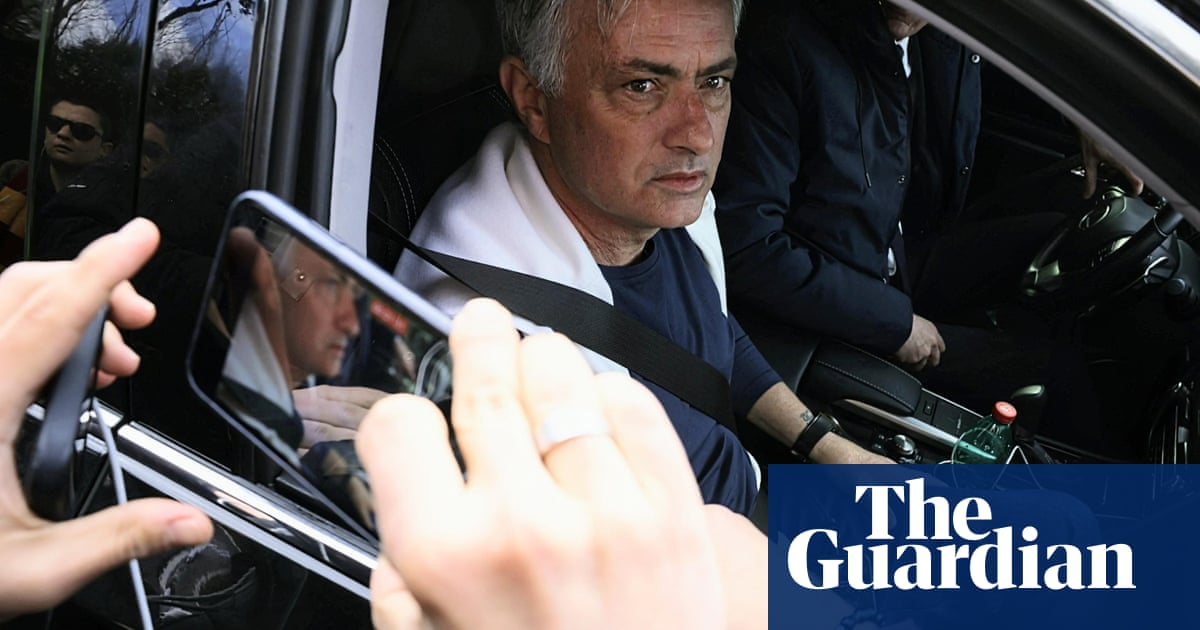
In the 76th minute of Manchester United’s win over Liverpool Lisandro Martínez boots it clear and collapses with cramp. As he lies motionless in his six-yard box like an extra from 1917, Michael Oliver stops the game. Fifty-three seconds later play restarts.
In the 87th minute cramp has coincidentally taken hold in Martínez’s taller partner – this time in both legs of Raphaël Varane, the poor chap. He straightens them like a Playmobil figure as he gently falls over. Roberto Firmino kindly offers his hand. Varane refuses – there’s a tiny moment of him being dragged a few inches along the floor on his backside like a dog with worms. By the time David de Gea takes the goal-kick, United are 45 seconds closer to victory.
When Mohamed Salah scores a few minutes before Varane is struck down, we have a classic of the refusing to give the ball back genre. Bruno Fernandes holds on – my ball, get your own. Salah goes for the grab. Fernandes is somehow blinded in one eye. About a minute later United kick off.
United’s triple substitution takes about a minute as they exit one by one. It’s all classic time-wasting. A minimum of five minutes stoppage time is suggested. It’s the perfect amount. Both not enough and too much. Five minutes feels like the shortest acceptable for a game where one side have been running down the clock for a while. But realistically it could well have been considerably more.
All teams do it, and it plays perfectly into our tribalism. When you’re winning you barely notice it; when you’re losing, the rage boils inside when a goalkeeper places the ball, paces out their runup for a goal-kick and then slowly walks back to readdress it and move it a centimetre.
There’s an amazing clip doing the rounds from the South African league in 2020, where Mamelodi Sundowns – leading 2-1 – have a corner in the 82nd minute. One player stands over it, takes ages and gets booked for time-wasting. He then walks off for a teammate to do exactly the same. As he is booked he steps aside for a third player to take it. He is also booked – and more than two minutes after the corner is awarded – the original taker goes back and whips it in. It is great entertainment. The commentators are in hysterics.
And this is before we consider goal celebrations, late melees, players feigning injury and Kasper Schmeichel refusing to give the ball to a desperate centre-forward who has grabbed one back.
Time-wasting works – referees don’t add enough on. During the 2018 World Cup, the statistical analysis website FiveThirtyEight analysed 32 matches. In those games, and including using Fifa’s guidance on stoppages (eg 30 seconds for a substitution etc) it found the average time that should have been added was 13 minutes and 10 seconds – roughly twice as much than was added at the end of the halves: just under seven minutes.
One fix for this is simple. Stop the clock. After Barcelona’s goalless draw at home to Rayo Vallecano on the opening day of the season, Xavi Hernández became the latest manager to call for it. “For me it’s a ridiculous situation and I’m not singling out Rayo here,” he said. “But I think we are the only sport where we never play the regulation time. Don’t we want fair play? Well, that would put an end to cheating.”
Mark Clattenburg suggested the same in the Daily Mail in May. “I think there’s a solution to all of this and that’s 60-minute matches with a stop clock – an idea which Pierluigi Collina, Fifa and Ifab are currently looking at. It works in basketball and it could work in football, too.”
And on the face of it it seems like a vaguely sensible idea. But however infuriating time-wasting is, there is a beauty to stoppage time. Basketball is an interesting comparison by Clattenburg, because it does have that throw-on-the-buzzer excitement that you see in every single American movie from the 80s. But the clock doesn’t help rugby or NFL – where we all know the result but have to wait for someone to boot the ball out of play or sit on it.
Not knowing exactly when the game will end adds drama. Waiting for the fourth official’s board, whatever predicament your team are in, with “Where did he get that from?” and “How much?” simultaneously yelled from opposing sides of the ground. Why did any of us learn to fingers-in-our-mouths whistle?
And great moments in football history happen in stoppage time. “It’s up for grabs now!” Jimmy Glass. Fergie time. Sergi Roberto v PSG. Anthony Knockaert, Manuel Almunia (how does he get the rebound?) and Troy Deeney. Agüerooooo. Of course there would still be drama at the end. But there’s a psychological moment for the players when the board goes up that you would lose. And that roar of hope from the losing crowd when the board says six minutes.
Last season the ball was in play on average in the Premier League for just over 55 minutes. The shortest last season was West Ham versus Brentford – 41 minutes and 33 seconds. Stop the clock and make that 60 minutes and you’d be there for ever.
Perhaps taking timekeeping out of the referee’s hands would help for more accuracy – but if we lost it altogether we’d miss David Platt with the ball under his arm, chest puffed out with purpose as he runs back and places the ball back on the centre spot. We’d miss the referee, hand aloft, blowing the final whistle. We’d miss 90 minutes. It’s 90 minutes of sheer hell – not 60. And maybe we’d even miss cramp – OK that’s a stretch (delivered by a furious opposing player).












